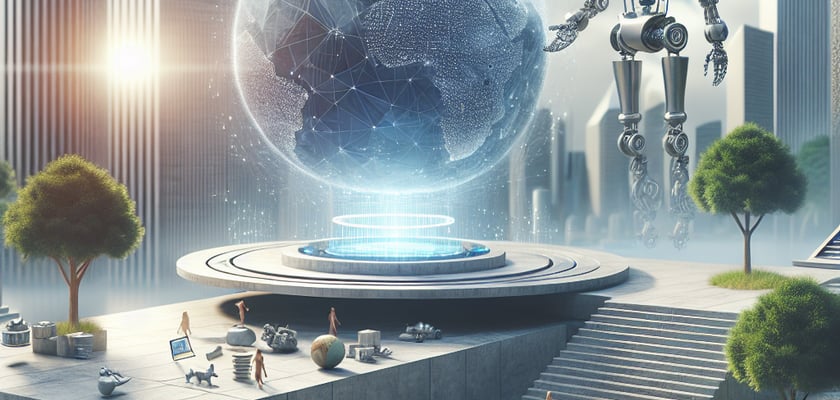Did you know that the average smartphone today has more computing power than NASA used to land astronauts on the moon in 1969? As easy as it is to forget while you’re flinging digital birds at rickety pig-constructed structures, technology is the silent puppeteer reshaping our future like a cosmic origami master. Our world is evolving so swiftly that sometimes I suspect our gadgets have secret meetings to plot their next ‘wow-the-humans’ feature while we sleep. From artificial intelligence that’s starting to think outside the proverbial box (and possibly about its future world domination plans) to self-driving cars that promise to let us nap through rush hour, technology’s advancements are as relentless as a toddler’s questions. And just when you thought you got a handle on the latest app, a new update swoops in, laughs at your puny efforts, and reshuffles the digital deck.
Now, strap on your virtual reality helmets and prepare to dive into the rabbit hole of tomorrow’s tech wonders—sans the white rabbit’s incessant timekeeping. Next, we’ll be warping into the not-so-distant future, where your fridge not only judges your food choices but also restocks itself (hopefully with plenty of ice cream). We’ll talk about how the Internet of Things may soon make it impossible to lose your remote (because let’s face it, it’s high time) and how blockchain technology might make paper contracts as outdated as floppy disks. Stay tuned as we hyperloop into the key takeaways, exploring the technological twists and turns that are more gripping than a soap opera plot twist, and remember, your next gadget might just be clever enough to read this article for you.
Key points I covered in this post
1. The acceleration of automation and AI has led to a significant transformation in the workplace, replacing routine, and manual jobs with technology-driven solutions. This shift is prompting a necessary re-evaluation of skills and job training, with a growing demand for workers skilled in technology and digital literacy to manage, maintain, and innovate with new tools.
2. Breakthroughs in health technology, including digital health records, telemedicine, and personalized medicine, offer the potential for more accessible, efficient, and tailored healthcare services. Advances in genomics and biotechnology are also paving the way for treatments that are customized to individual genetic profiles, improving outcomes and potentially lowering healthcare costs.
3. Environmental sustainability has become a core focus area, with technology playing a crucial role in addressing climate change. Innovations such as renewable energy technologies, smart grids, and energy-efficient transportation systems are helping to reduce carbon footprints and manage resources more effectively. Additionally, big data and IoT devices are being utilized for monitoring environmental impacts and optimizing energy use.
4. The proliferation of smart devices and the Internet of Things (IoT) is ushering in an era of hyper-connectivity, where everyday objects are embedded with sensors and connectivity, enabling them to collect and exchange data. This interconnectedness has vast potential for smart homes, cities, and industries, creating opportunities for improved efficiency, safety, and convenience across various sectors.
5. Ethical concerns and the need for regulation have come to the forefront as technology evolves. Issues around privacy, data ownership, cybersecurity, and the societal impact of technology dominate discussions, prompting calls for responsible innovation and governance frameworks that ensure technology benefits society while minimizing potential harms and inequalities. This includes considering the implications of emerging technologies such as facial recognition and deepfake technologies.
In What Ways Is Technological Advancement Shaping Our Future?
The future is being **shaped by technology** through its pervasive integration in daily life, impacting fields such as healthcare, education, and transportation. **Advancements in AI and machine learning** are leading to smarter solutions in data processing and decision-making, while **breakthroughs in medical technology** have the potential to alter disease treatment fundamentally. Technology’s evolution prompts **sustainability through renewable energy innovations**, and the digitization of industries suggests an unprecedented shift in job markets and skills requirements.
Artificial Intelligence and Machine Learning
Artificial intelligence (AI) and machine learning are revolutionizing countless industries by enabling machines to learn from data, improve processes, and perform tasks that were previously impossible without human intelligence. In healthcare, AI algorithms are assisting in diagnosing diseases more accurately and swiftly than ever. The manufacturing sector utilizes AI to optimize production lines and reduce waste, while self-driving vehicles employ AI to navigate roads safely.
Healthcare Technology Breakthroughs
Groundbreaking technological innovations in healthcare promise to extend life expectancy and improve quality of life. Telemedicine offers remote diagnostics and consultations, reducing the need for physical clinic visits. Wearable devices monitor vital signs in real-time, providing early warnings for potential health issues. Furthermore, personalized medicine, driven by genetic analysis, is offering treatments tailored to individual patients, potentially improving outcomes and minimizing side effects.
Rise of Renewable Energy Technologies
Renewable energy technologies such as solar panels, wind turbines, and battery storage systems are becoming more efficient and affordable, facilitating a transition to a more sustainable and resilient energy grid. This shift not only combats climate change but also creates new industries and jobs. Electric vehicles (EVs), powered by clean energy, are starting to replace traditional gasoline-powered cars, contributing to a decrease in carbon emissions.
Education Transformed by Digitalization
The digitalization of education is demolishing geographical barriers, granting universal access to information, and personalized learning experiences. Online courses and e-learning platforms are becoming increasingly prevalent, allowing students from around the world to participate in high-quality educational offerings. Virtual reality (VR) and augmented reality (AR) are poised to enhance the learning experience by providing immersive and interactive learning environments.
Impact on Employment and Required Skill Sets
The adoption of advanced technologies is also reshaping the workforce. Automation and robotics are transforming job roles, creating a demand for new skills such as digital literacy, problem-solving, and adaptability. As certain tasks become automated, there is a heightened need for skills that are uniquely human, such as creativity, emotional intelligence, and interpersonal communication.
What Are Some Key Tips for Adapting to the Technological Changes of the Future?
- Continuously learn and upgrade your skills to remain relevant in the rapidly evolving job market.
- Stay informed about the latest technological trends and advancements to anticipate changes in your field.
- Adopt a flexible mindset and be open to new ways of working, such as remote collaboration and digital nomadism.
- Focus on developing strong critical thinking and problem-solving abilities to navigate the complexities introduced by new technologies.
- Invest in personal and professional networks to leverage collective knowledge and opportunities in technology-driven environments.
What are the most significant technological advances shaping the future?
Major technological advances that are shaping the future include artificial intelligence (AI), machine learning, robotics, blockchain technology, and quantum computing. These technologies are revolutionizing various sectors, from healthcare and transportation to finance and manufacturing, making processes more efficient, personalized, and accessible.
How is technology impacting the job market?
Technology is both creating new job opportunities and rendering some jobs obsolete. Automation and AI are taking over repetitive tasks, leading to the displacement of certain types of jobs. However, they are also generating new roles in tech development, data analysis, and AI ethics. The job market is evolving, demanding a more tech-savvy workforce, and lifelong learning is becoming increasingly important for career longevity.
Will technology bridge or increase the socio-economic gap?
Technology has the potential to bridge the socio-economic gap by providing access to information, services, and opportunities that were previously unavailable to underprivileged populations. Digital platforms can enable remote work, education, and healthcare. However, there is also a risk of increasing disparity if the digital divide is not addressed, as those without access to technology may fall further behind.
What is the role of technology in combating climate change?
Technology plays a vital role in addressing environmental challenges and combating climate change. Innovations in renewable energy, smart grids, and energy-efficient technologies are crucial in reducing greenhouse gas emissions. Moreover, data analytics and AI can help in monitoring environmental changes, predicting patterns, and creating more sustainable practices across industries.
How will advances in technology affect our privacy and security?
As technology becomes more integrated into our lives, concerns about privacy and security become more significant. While technology can enhance security measures, the increase in data collection and interconnected devices creates more vulnerabilities. It is essential to implement robust security protocols and promote awareness of digital privacy rights and best practices among users.
Final Thoughts
As we look to the future, it is clear that technology will continue to be a driving force in shaping our world. The rapid pace of technological innovation presents both challenges and opportunities. While there are concerns about job displacement, privacy, and the digital divide, advances in technology are also catalyzing social progress, enabling solutions for global challenges, and offering unprecedented possibilities for enhancing the human experience. As society navigates this complex landscape, the ultimate impact of technology will depend on our ability to leverage it for the greater good while addressing its inherent risks.
Overall, the future shaped by technology is one of potential and promise, if harnessed responsibly. Collaboration across industries, governments, and communities is essential to direct technological progress in ways that will most benefit humanity. By developing ethical frameworks, fostering inclusive access to technological advancements, and continuously adapting to the changing digital environment, we can steer the future towards a positive and sustainable trajectory.

